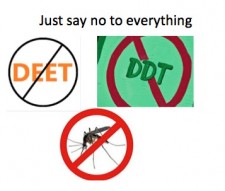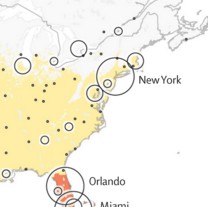 The surest way to avoid worrying about getting the Zika virus is avoid being bitten by a mosquito transmitting it. That means sales of repellents are very likely to boom. Almost all products to keep mosquitoes away contain the active ingredient N,N-diethyl-meta-toluamide, commonly called DEET. Even the CDC recommends it.
The surest way to avoid worrying about getting the Zika virus is avoid being bitten by a mosquito transmitting it. That means sales of repellents are very likely to boom. Almost all products to keep mosquitoes away contain the active ingredient N,N-diethyl-meta-toluamide, commonly called DEET. Even the CDC recommends it.
It is not perfect, though. For one thing, it is a repellent, not a pesticide. Some say we should kill bugs so that they never harm anyone and they have asked why we shouldn't reconsider a pesticide like DDT. (The Environmental Protection Agency bans it in the United States, but officials show developing countries with vector-borne diseases how to spray it inside homes.) It works to stop bugs from spreading malaria, so it will stop Zika if need be.
What about people who think they can lead a "chemical-free" life? They're out of luck with either, as they always have been, because such a lifestyle has never been more than an ignorant fantasy. Yet if they are really worried about chemical exposure, there are reasons they might actually prefer DDT.
It needs to be discussed all over the nation because even though mosquito season is still months away for much of the country, the Zika infection has been found to be transmissible by common Culex mosquitoes, at least in a lab setting -- which means a whole lot of people in the north could be at risk as well. A new vector would make it necessary for many of us to think about choices if the infection becomes common outside of the south. Below is a model of which areas in the U.S. could be at risk.

Source: The Lancet
Since 90 percent of mosquito repellents use DEET, I thought it might be worthwhile to write about what the stuff is, some of its properties, and then to contrast it with DDT, a chemical with a far worse reputation. They are quite different, but not how you might expect.
What is especially interesting about DEET is not that it is toxic (quite the opposite, really) but that it has the ability to penetrate skin rather easily. Depending on a number of factors (species, test method, type of skin, other the presence of solvents) between 8 and 80 percent of DEET that is applied to skin will end up in the bloodstream. That's a lot. But after that, it behaves just like most other chemicals or drugs: it is metabolized by the liver, and excreted, mostly in the urine.
DEET does repel mosquitoes, though with mixed results. DDT is, of course, an insecticide, and used to kill mosquitoes. It also acts as a repellant when sprayed on surfaces. Although its use is banned in the U.S. over 40 years ago by the EPA, the World Health Organization recommends it in malaria-infested areas such as Africa.
So why does DDT have such a terrible reputation in the U.S.? It has little to do with actual toxicity.
This table contains some properties of both chemicals:

One comforting thing is that DEET has a very low toxicity. It is not even a suspected carcinogen in a world where the International Agency for Research on Cancer (IARC) can call anything a carcinogen -- even sausage. We can say it's a safe chemical when used properly. But, it is still not recommended for use on children younger than two months, and products containing 30 percent DEET or more are not recommended for children at all. That means the ability of a repellent alone to protect our most vulnerable population is limited. Mosquitoes don't care about age.
DDT, on the other hand, is a repellent that also kills mosquitoes. And as I've written before it isn't even remotely as harmful as its perception suggests. Its ban was not even based on human health. Despite everything that you've heard about it, DDT was banned because of environmental concerns, which I won't go into here. Despite all the cancer and other various scares, its toxicology profile reads much like that of a typical chemical or drug. And, of course, it has one big advantage for people worried about exposure to chemicals -- it is sprayed on bugs rather than kids.
There are other repellents and insecticides out there. And maybe Zika will be out there too, at which point some complicated, hard choices will have to be made. Some dark humor in the immunology community during the Ebola scare in 2014 was whether anti-vaccine parents were going to be first in line with bags of cash asking for a shot for their kids. Likewise, it may be that the loudest calls for more pesticides may come from chemophobic hypocrites, who don't mind exposing a child to a disease as long it is not their child.
So, DDT or DEET? Or something else? What is the best choice? We don't know yet. It still depends on what happens in a few months. Stay tuned.



